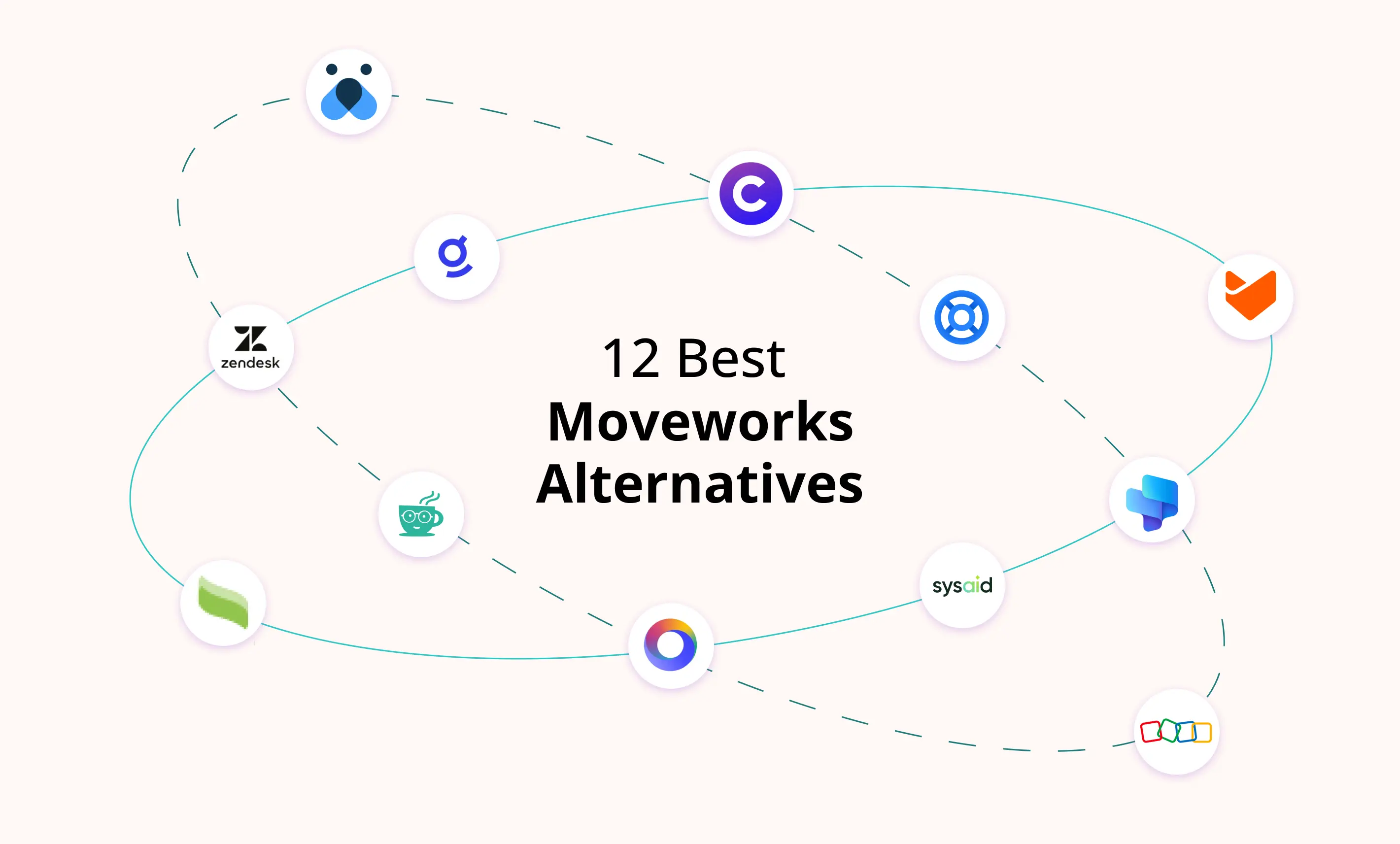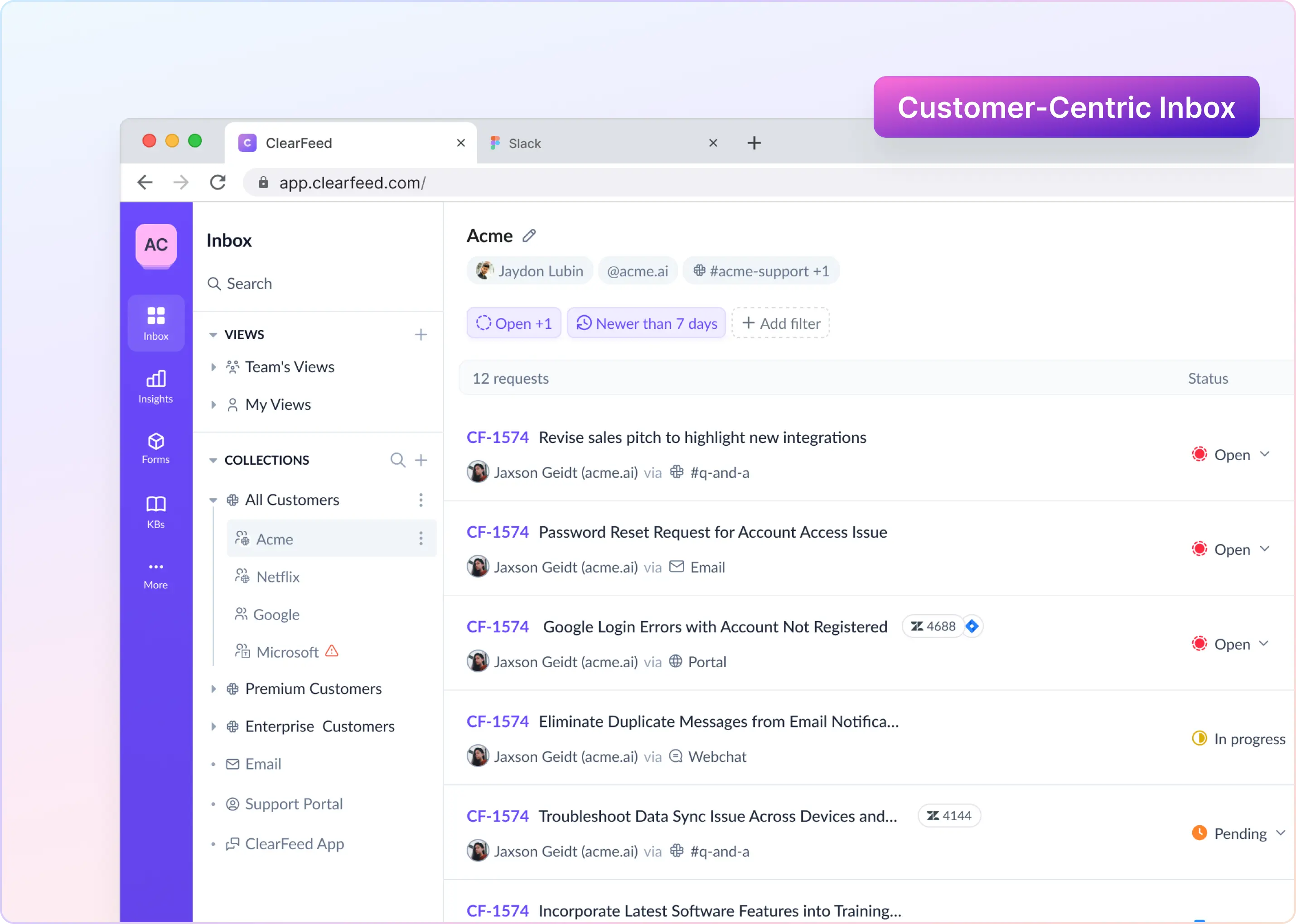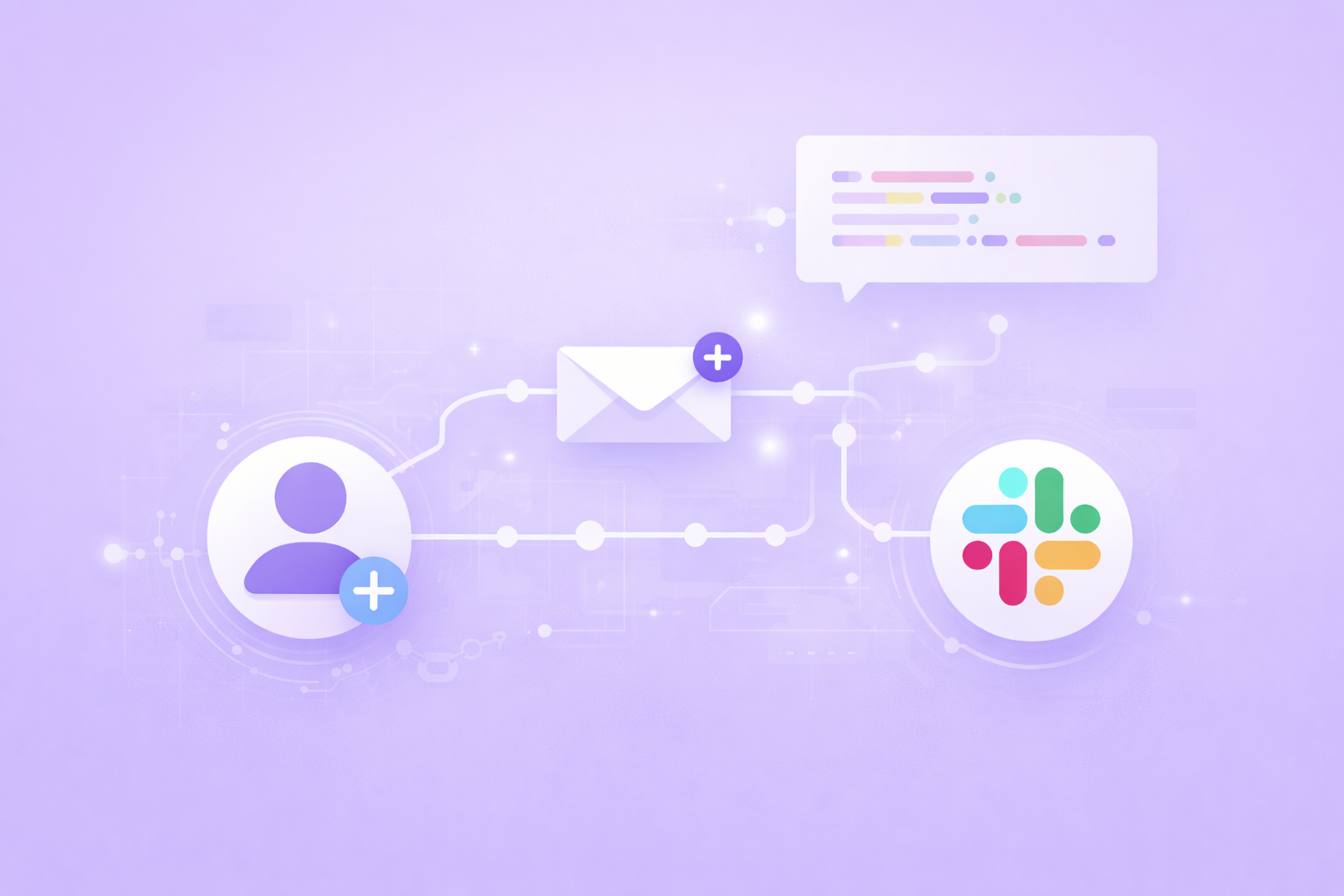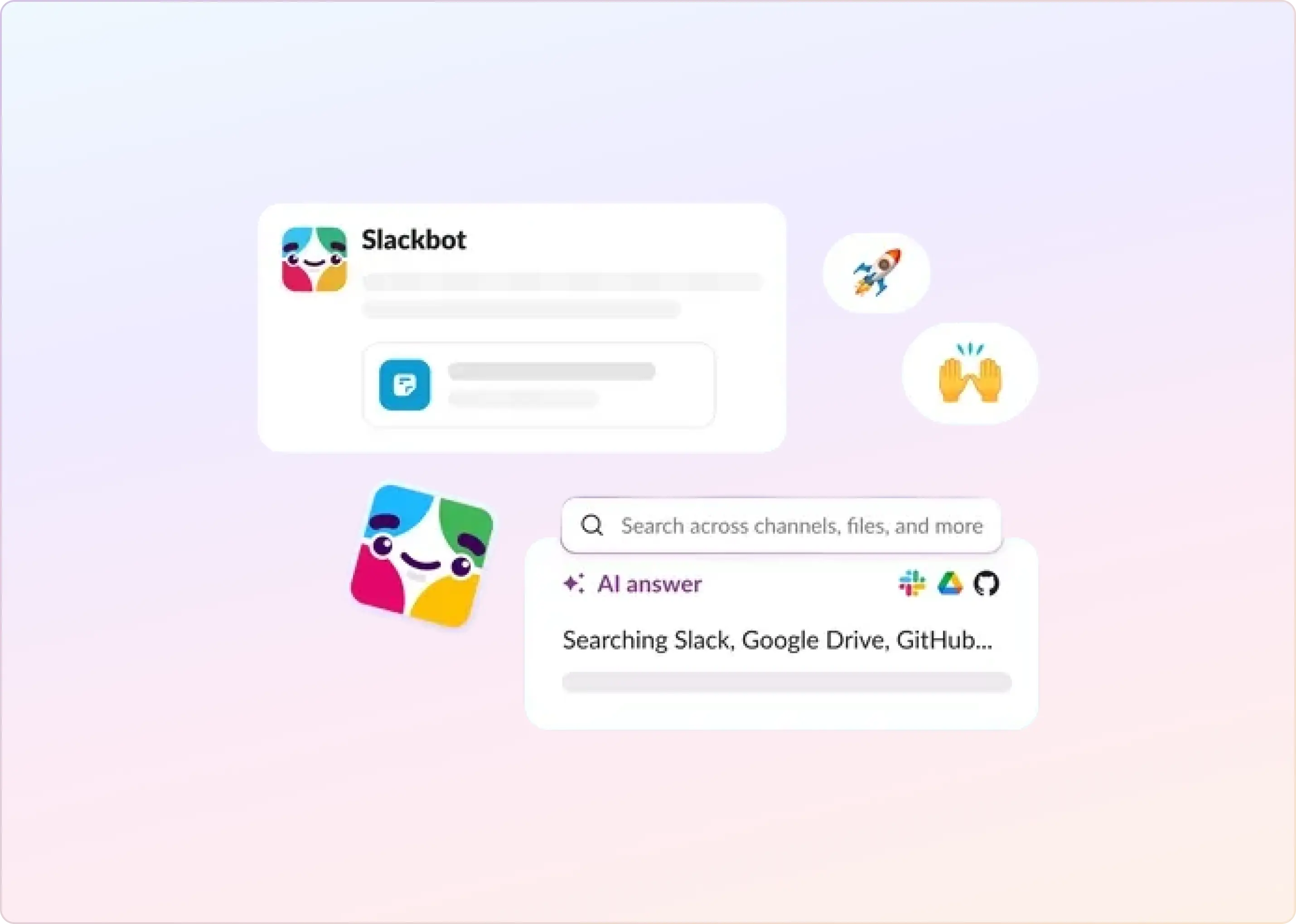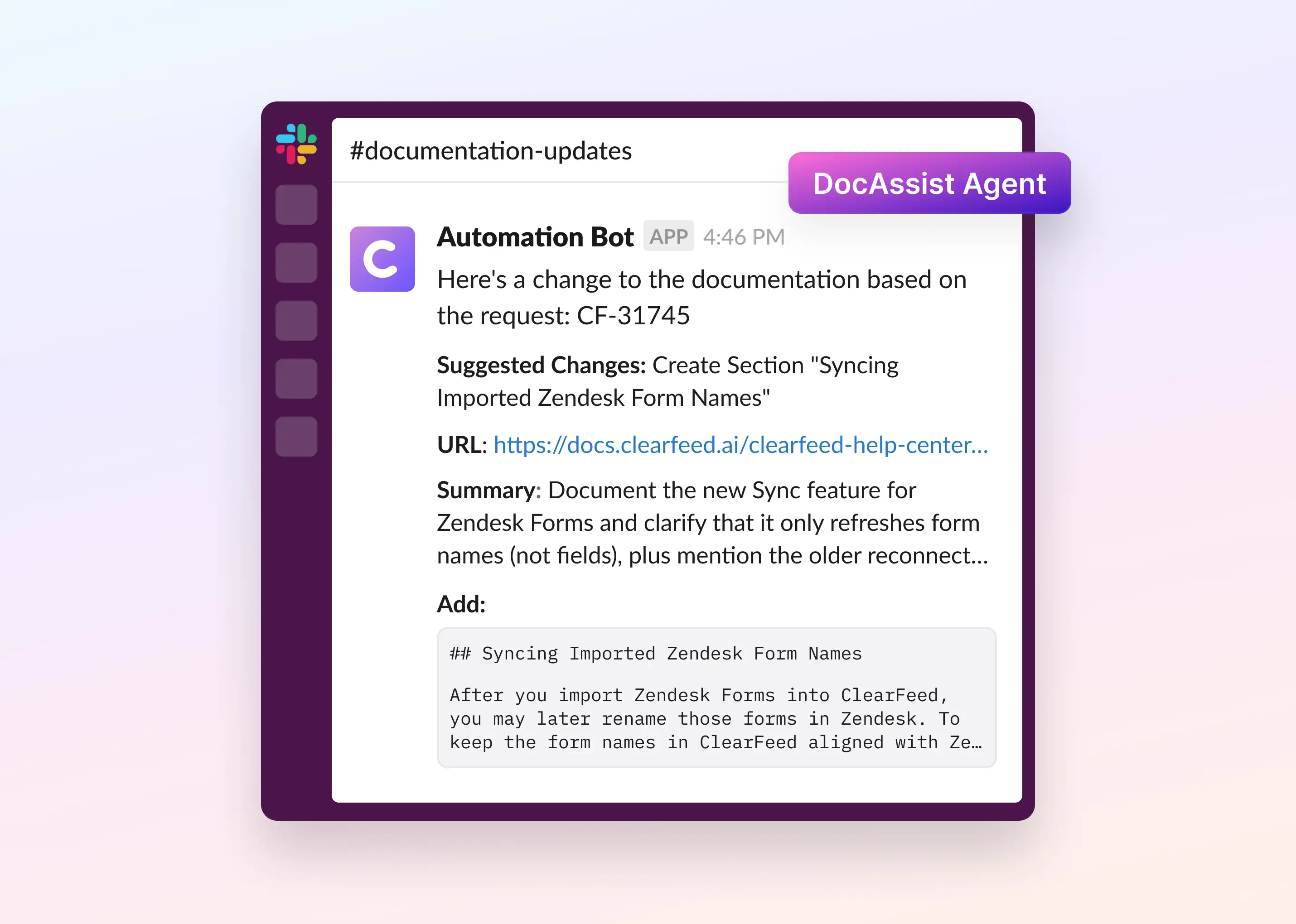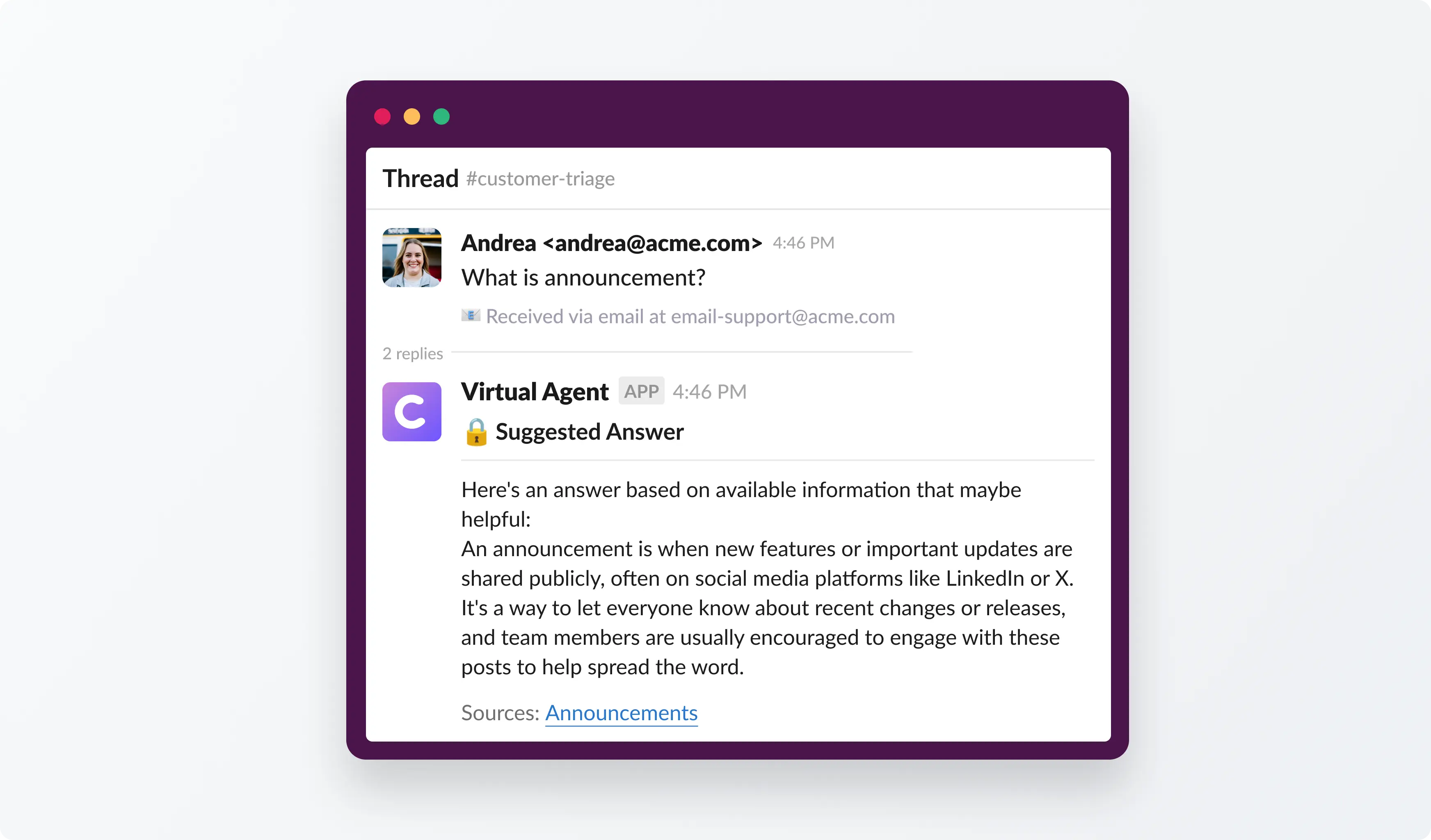Moveworks was the trusted AI copilot for many IT, HR, and finance teams. It handled everyday tasks like password resets, software access, and HR questions through tools like Slack, Teams, Jira, and ServiceNow. This saved employees' time and eased the pressure on helpdesks.
But things changed in March 2025, when ServiceNow announced it was acquiring Moveworks. And with any significant acquisition, uncertainty follows. Teams have started asking: Will costs go up? Will priorities change? Will the product stay as flexible as it’s always been?
If you’re in the same boat, you’re not alone. When a tool you depend on is going through significant changes, it’s natural to start looking at other options. Fortunately, there are several AI solutions out there that match (or even outperform) what Moveworks offers, without compromising on security, scalability, or budget.
To help you find the right fit, we've put together 12 of the best Moveworks alternatives, with a clear breakdown of their strengths, weaknesses, and ideal use cases.
TL;DR
- Moveworks’ acquisition by ServiceNow has prompted many teams to explore simpler, more cost-effective alternatives.
- The best options offer smart AI, strong integrations (Slack, Teams, Jira), fast ROI, and easy customization. Support platforms now go beyond IT, covering HR, finance, and CX.
- ClearFeed leads for chat-first teams on Slack/Teams wanting human-friendly automation, while other platforms like Zendesk AI or Aisera work better for customer-facing or significant enterprise needs.
What to Look for in a Moveworks Alternative
When you're evaluating alternatives, don’t just scan the feature list. The right solution should fit your workflows, integrate with your tools, and improve support, without adding complexity.
Here’s what to prioritize:
- Ecosystem fit: Works with existing tools like Slack, Teams, Jira, ServiceNow, Zendesk, Freshdesk, and more, so your team can stay in the tools they already use. No unnecessary context switching.
- Smart AI: Understands nuanced language and handles multi-turn conversations, giving employees clear, accurate answers instead of frustrating dead ends.
- Broad use cases: Covers IT, HR, finance, and CX in one platform, so you don’t end up managing (and paying for) multiple tools. For instance, the same AI that processes access requests can also handle PTO questions or procurement workflows.
- Fast ROI, predictable costs: You shouldn’t need a 6-month onboarding plan. The best tools are quick to set up, deliver value early, and don’t come with surprise costs.
- Easy to customize: You should be able to tweak workflows without hiring consultants. Low-code options enable ops and support teams to handle updates independently.
- Deep automation: The tool should resolve routine issues automatically while escalating the right ones. Example: If a support engineer logs a bug, the platform should route it to the right Jira board and ping the dev team in Slack, without human handoffs.
- Trustworthy: Look for enterprise-grade compliance like SOC 2 and GDPR. This matters more when sensitive data flows through the system.
- Employee-friendly: It should be intuitive to use and embedded in familiar tools, so employees can adopt it and resolve issues independently.
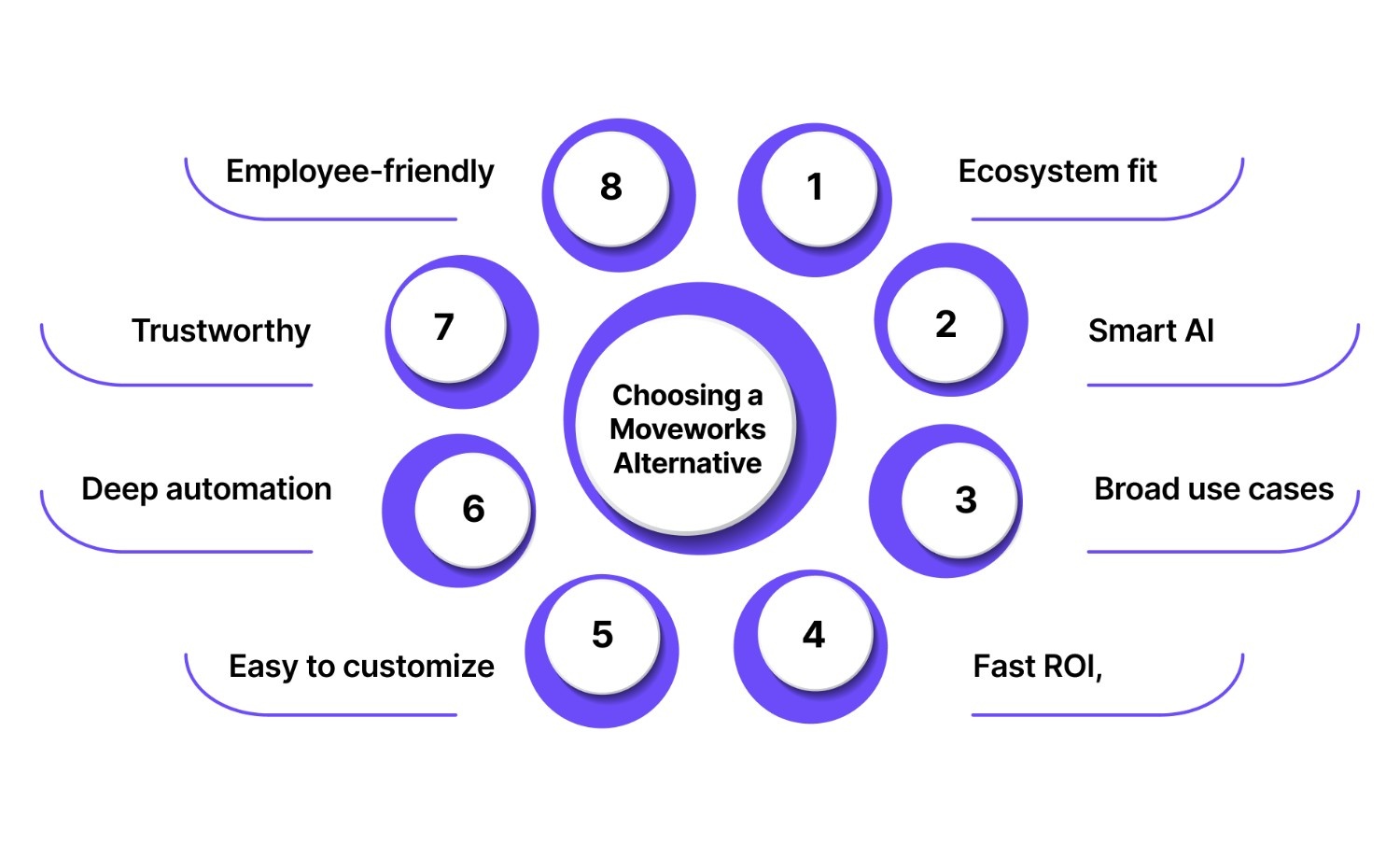
Keep these criteria in mind as we dive into the most effective Moveworks alternatives for 2025.
Top 12 Moveworks Alternatives in 2025
This list includes a mix of direct competitors, ITSM platforms with AI, workflow automation tools, and specialized AI support solutions. Each comes with its strengths, depending on your team size, workflows, and goals.
For example, ClearFeed works best for chat-first, collaborative teams, while Zendesk AI suits customer-facing teams already using Zendesk.
Here’s a quick look at the top options before we get into the details:
Let’s look at an in-depth review of each alternative:
1. ClearFeed AI
Best for: Teams on Slack or Teams that want lightweight, chat-first automation alongside their existing ITSM tools.
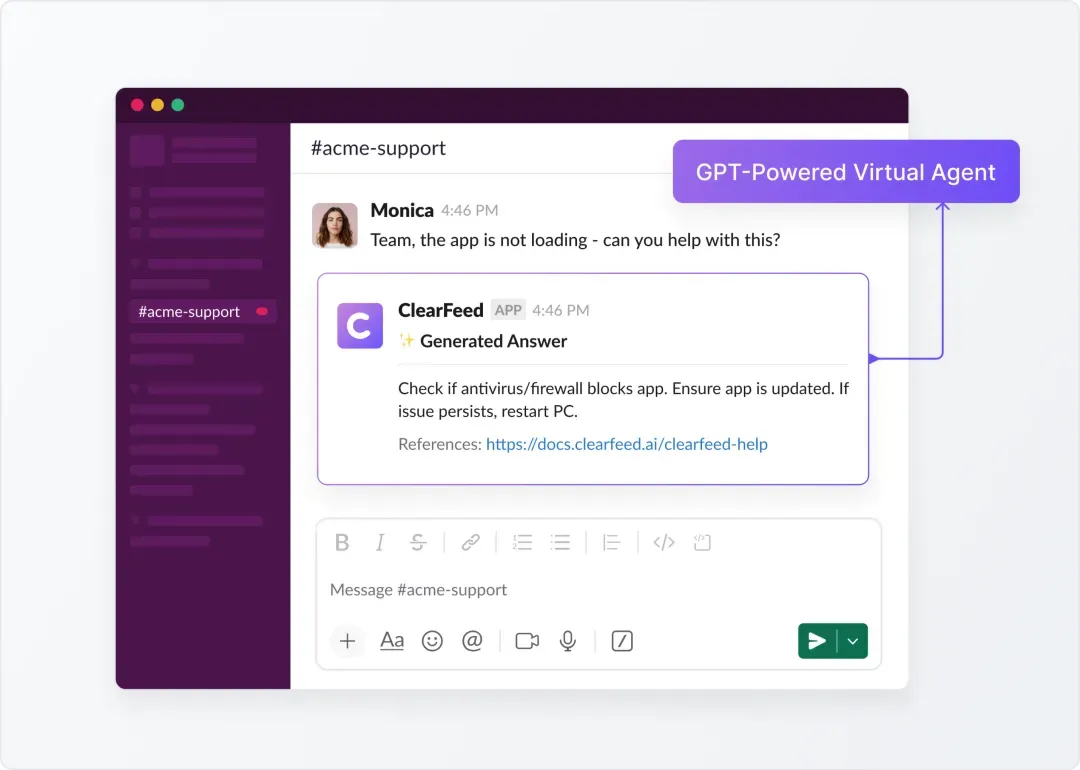
ClearFeed is a conversational AI platform for Slack and MS Teams that supports both internal and external support workflows. It combines an AI virtual agent to resolve routine questions with an agent-assist feature to help human agents reply faster, all without leaving your chat tools.
Feature Highlights:
- Virtual Agent: Handles FAQs, approvals, and repetitive requests automatically, deflecting tickets with context-aware answers in Slack/Teams.
- Agent Assistant: Suggests real-time, relevant responses to help agents resolve tickets faster.
- Built-in Ticketing & Workflows: File Tickets in ClearFeed with SLAs, CSAT, Triage channels, Forms, Smart Routing and more..
- Integration with Enterprise Ticketing: File Tickets for unresolved queries in Zendesk, Jira, ClickUp, Linear, Asana and more.
- AI-Powered Insights: Summarizes threads, detects sentiment, flags unresolved issues, and drafts replies using GPT-powered intelligence.
- Action Automation: Automates Actions like Password Resolution, CRM Updates, Getting Device data etc across Okta, HubSpot, Kandji, BambooHR and more.
- Analytics & Reporting: Dashboards to track ticket volume, deflection rates, SLA compliance, resolution times, and agent productivity.
Pricing:
ClearFeed offers standalone AI functionality - with or without helpdesk functionality. Relevant pricing includes
- GPT-Powered Agents – Starts at $20/100 invocations.
- Helpdesk Pricing – Priced by Agent or Ticket Volume depending on use case starting at $24/month for 1 Agent, or $49/month for 250 tickets.
2. Zendesk AI
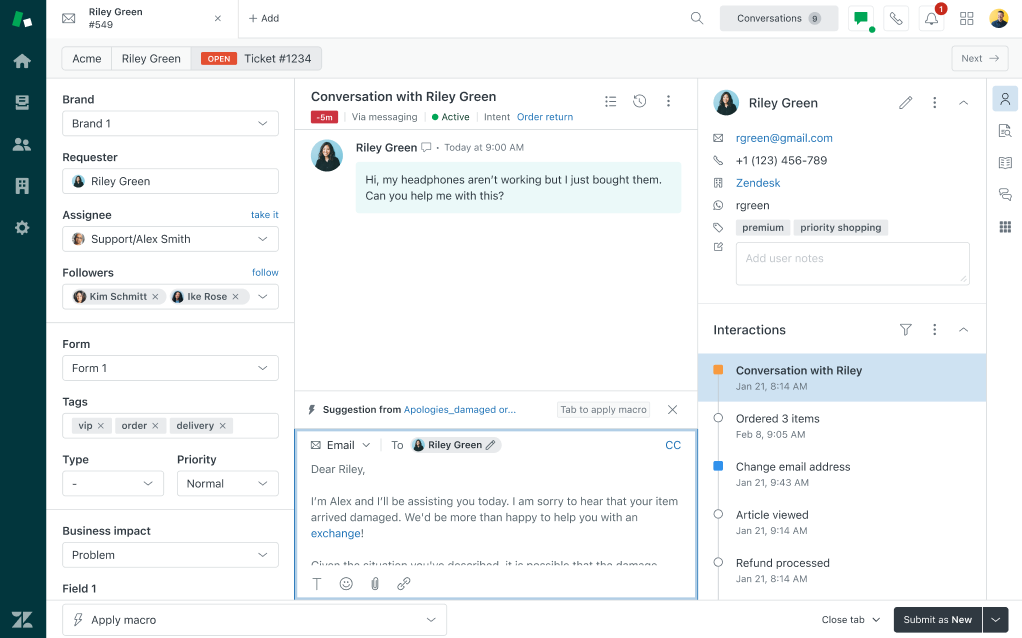
Best for: Teams already using Zendesk who want AI embedded in customer service workflows.
Zendesk AI enhances the Zendesk customer service platform with automation, intelligence, and conversational bots. It helps teams resolve tickets faster, deflect repetitive queries, and improve customer experience by embedding AI directly into your existing workflows.
The Advanced AI add-on adds features like agent copilot, intelligent triage, macro suggestions, and advanced analytics for even greater efficiency.
Feature Highlights:
- Intelligent Triage & Routing: Automatically categorizes, prioritizes, and assigns tickets based on intent, sentiment, and language.
- Agent Copilot: Assists agents in real time with suggested replies, macros, and actions.
- Generative Reply & Content Writing: Draft customer responses and help center articles.
- Macro & Knowledge Suggestions: Recommends new macros and articles based on emerging trends.
- Automated Replies: Handles routine, repetitive customer queries without agent intervention.
- Multichannel Support: Works seamlessly across email, chat, voice, and social media.
- Analytics & Insights: Provides sentiment analysis, ticket summaries, and detailed performance dashboards.
Limitation: Primarily designed for external customer support, not ideal for internal IT or HR workflows. Requires Zendesk as the core platform; not a standalone AI product.
Pricing:
- Zendesk Suite: $55 to $115 per agent per month (annual billing)
- Advanced AI Add-on: $50 per agent per month (Professional plan and above)
- Optional Add-ons: Workforce Management ($25), Quality Assurance ($35), Privacy Tools ($50) per agent per month
3. Freshservice
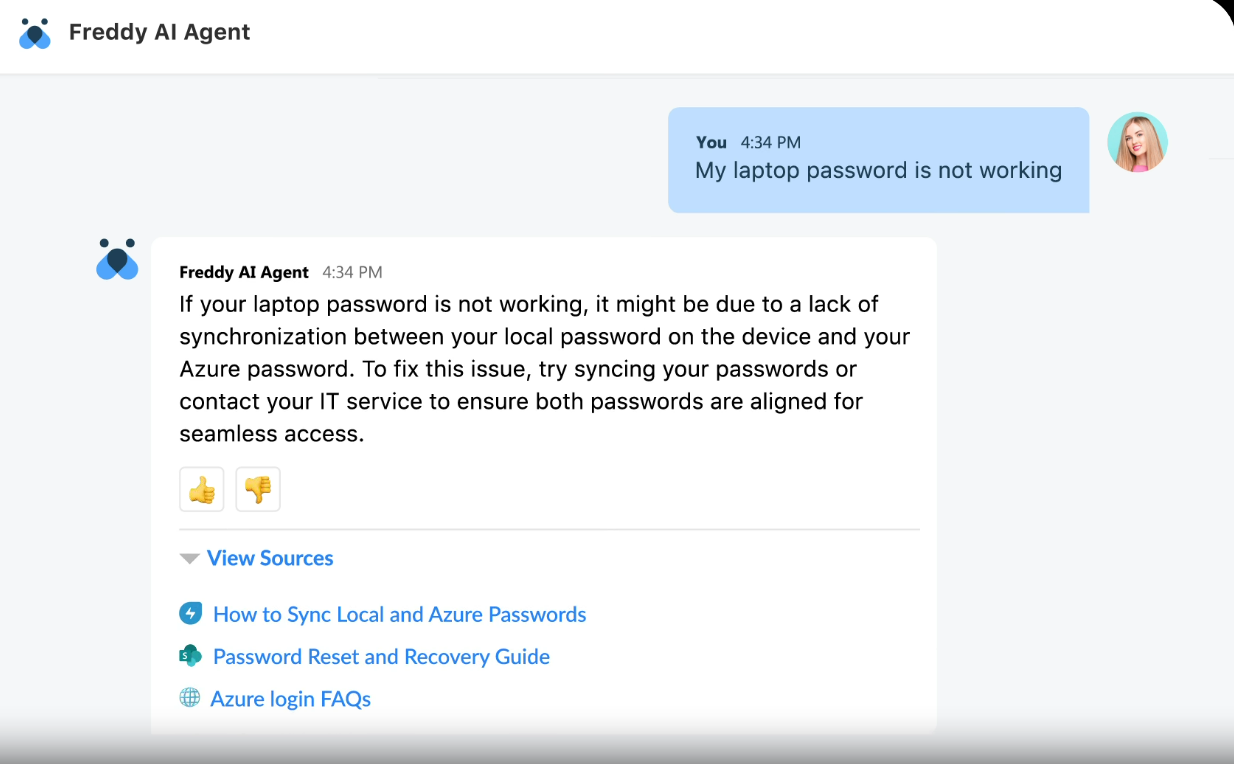
Best for: IT teams seeking a comprehensive ITSM suite with integrated AI automation.
Freshservice by Freshworks is a cloud-based ITSM platform designed for easy deployment, intuitive ticketing, and flexible workflows. Its AI layer, Freddy AI, adds automation, conversational self-service, and agent assistance. Together, they help IT teams cut ticket volumes, resolve issues faster, and improve service delivery.
Freddy AI works smoothly within Slack, MS Teams, email, and web portals, so employees can get help directly in the tools they already use.
Feature Highlights:
- Conversational AI Agent: Always-on self-service through Slack, Teams, email, and web, answering routine IT requests with context-aware replies.
- Agent Copilot: Assists agents with suggested responses, ticket summaries, and knowledge recommendations.
- Generative Insights: Detects patterns, anomalies, and root causes in service desk metrics, offering actionable insights to improve performance.
- Proactive Monitoring: Automatically identifies SLA risks, bottlenecks, and improvement opportunities.
- No-Code Setup: Deploys quickly and integrates with collaboration tools through ServiceBot.
- Multilingual & Multi-turn: Supports natural conversations in 40+ languages, maintaining context across interactions.
- Knowledge Integration: Pulls in the most relevant articles and documentation in real time.
Limitation: Only available within the Freshservice ITSM platform; not a standalone AI layer.
Pricing:
- Freddy AI Copilot add-on (Generative AI for agents): Available on Pro and Enterprise plans for $29 per agent per month (Annual billing)
- Freddy AI Agent (AI bot for self-service): Included as a beta feature in the Enterprise plan (with usage limits)
- Freshservice plans: $19 to $99 per agent per month (Annual billing), based on tier
4. Atlassian Assist
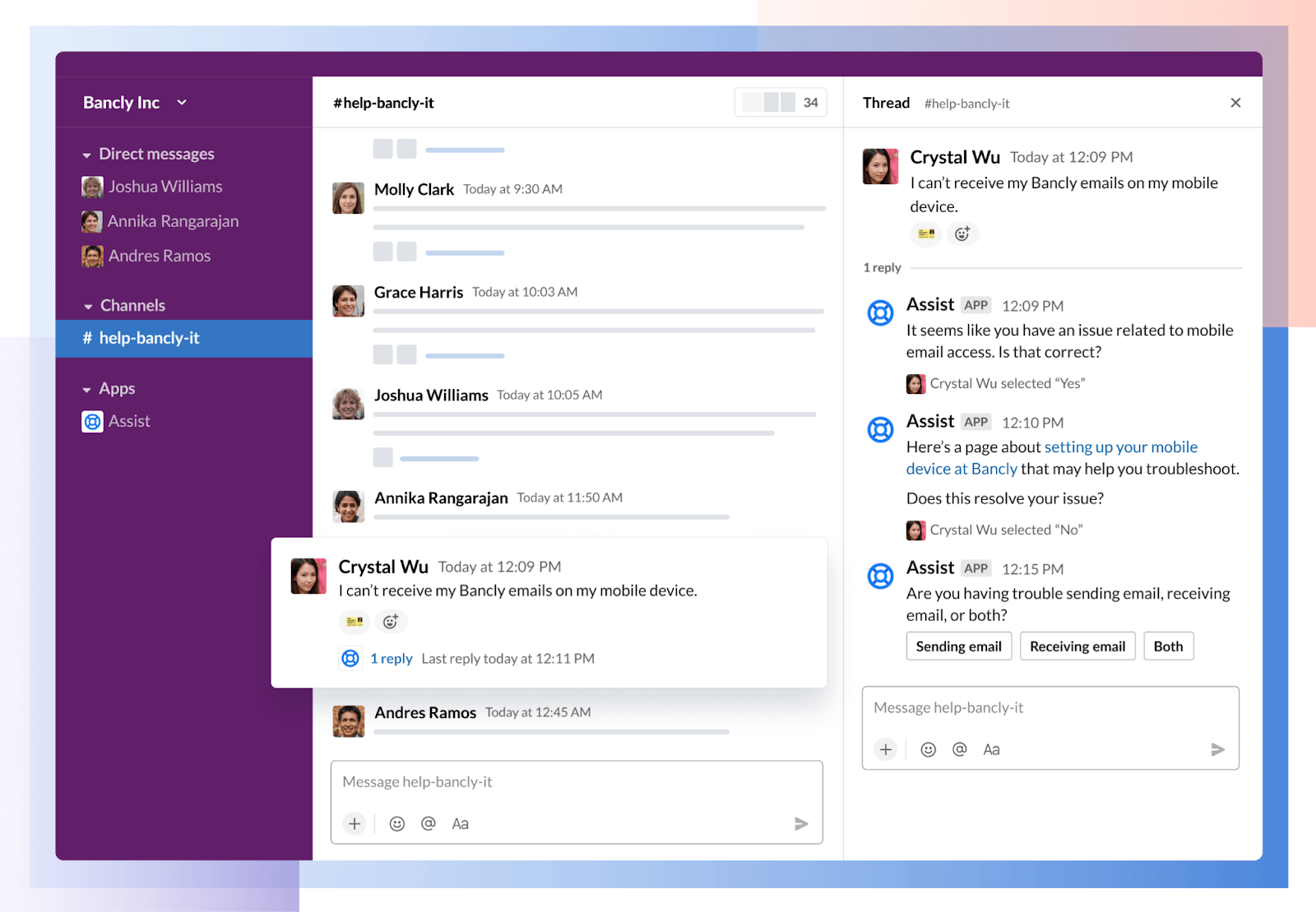
Best for: Teams on Jira Service Management looking for chat-based ticketing in Slack/Teams.
Atlassian Assist (formerly Halp) brings conversational ticketing directly into Slack and Microsoft Teams, fully integrated with Jira Service Management (JSM). Employees can raise, reply to, and resolve tickets without leaving chat, with bi-directional sync to Jira in real time.
If your IT team already runs on Jira Service Management and wants to make ticketing more intuitive for end users, Assist is a natural extension.
Features Highlights:
- Two-Way Ticketing: Create, assign, prioritize, and resolve tickets in Slack or Teams, automatically synced with Jira.
- Custom Workflows: Configure request types, routing, and automation rules in Jira, triggered via chat commands.
- Private Notes & Approvals: Agents can add internal notes and trigger approval workflows directly in Slack/Teams, with updates reflected in Jira.
- Emoji-triggered actions: Use custom emojis in chat to quickly create or update tickets (e.g., reacting with :ticket: converts a message to a ticket).
- Custom Forms in Chat: Collect structured ticket information right inside Slack/Teams using configurable forms, mapped to Jira fields.
- Automation & Macros: Use shortcuts and Jira automation for repetitive actions like status updates and notifications.
- Analytics & Reporting: Track SLA performance, ticket volumes, resolution times, and more through Jira’s built-in dashboards.
- SLA Tracking: Monitor and enforce SLAs even when tickets are created and managed in chat.
Limitation: Only works if you already use Jira Service Management as your ITSM platform.
Pricing:
Included in Jira Service Management Premium and Enterprise plans. Premium starts at $47.82 per agent/month (billed monthly); Enterprise pricing is custom.
5. HappyFox's GenAI Assist
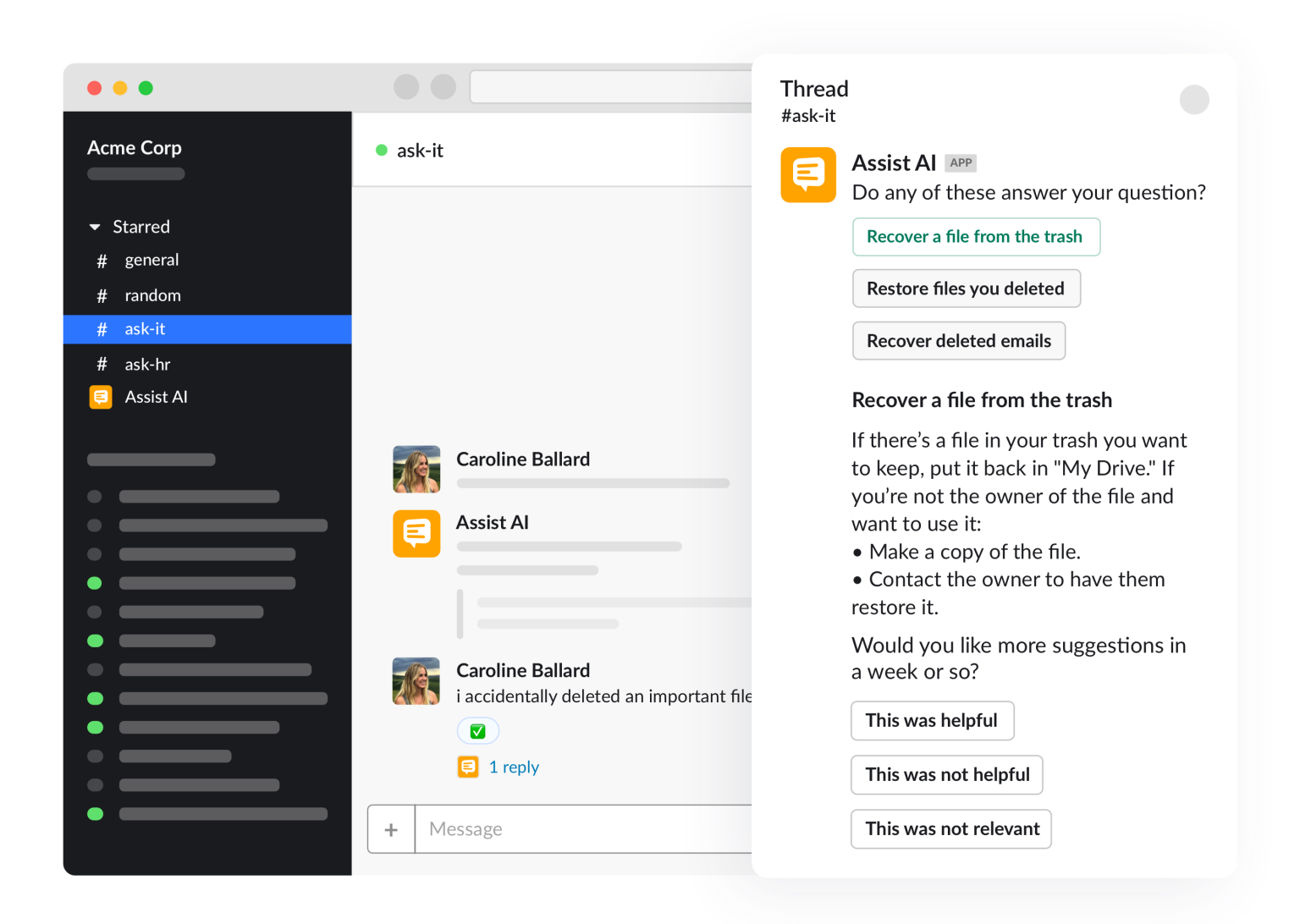
Best for: Small to midsize teams looking for affordable, easy-to-deploy AI for internal support.
HappyFox Assist AI, also known as GenAI Assist, is a conversational AI built for internal IT and HR support directly in Slack and Microsoft Teams. It handles everyday tasks like password resets, onboarding questions, and policy FAQs, while escalating more complex issues to human agents effortlessly.
Feature Highlights:
- Instant Self-Service: Employees can request help or ask questions directly in Slack or Teams and get immediate, actionable responses.
- Conversational Ticketing: When escalation is needed, Assist AI creates a helpdesk ticket straight from the chat, passing full context to the agent.
- Automated Actions: Handles common tasks like Okta account unlocks and Azure AD password resets directly in chat, with confirmation.
- Human Handoff: Effortlessly escalates unresolved issues to agents, with full context intact.
- Knowledge Base Integration: Surfaces relevant articles from Confluence, Notion, GitBook, SharePoint, and others to help employees self-resolve.
- Integration Ecosystem: Connects with Slack, Teams, HappyFox Helpdesk/Service Desk, Azure AD, SharePoint, Confluence, and more.
Limitation: Lacks advanced customization, analytics, and enterprise-grade orchestration found in larger AI service platforms.
Pricing:
Starts at $1 per user per month (Pro plan), with higher tiers adding more features
6. SysAid
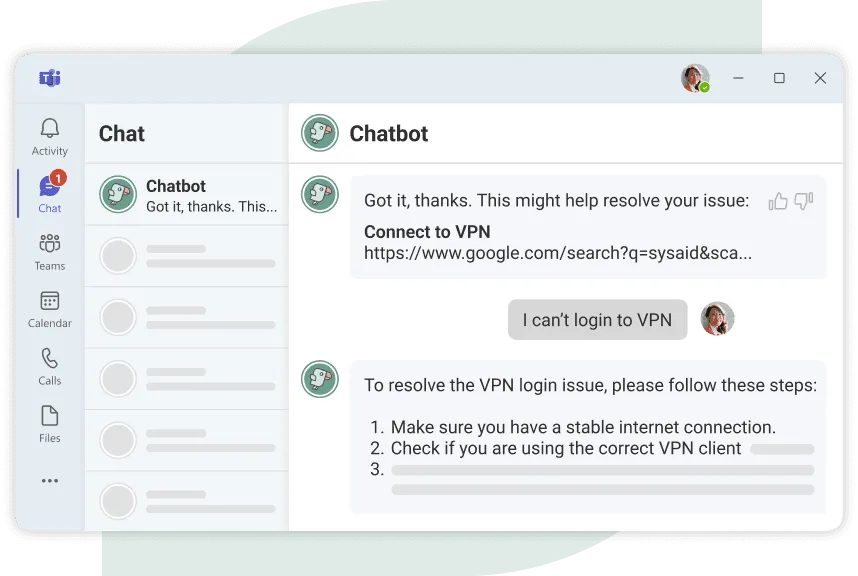
Best for: Mid-sized IT support teams wanting cost-effective ITSM with built-in AI.
SysAid is an ITSM platform with embedded generative AI to help automate repetitive tasks, streamline self-service, and improve agent productivity. It offers two copilots: one for employees and one for agents, integrated across Microsoft Teams, email, chat, and web portals for a unified experience.
Feature Highlights:
- Self-Service Copilot: A Virtual assistant that helps employees resolve common issues, find KB articles, or open tickets through chat, email, or portal.
- Copilot for Agents: Suggests ticket replies, drafts, summaries, sentiment analysis, and next-best actions to help agents handle complex cases faster.
- End-User Bots: Chatbot and emailbot provide instant employee self-service by resolving simple requests or creating tickets when needed.
- Prebuilt AI Agents: Automate repetitive tasks like ticket categorization, routing, group assignment, and even proactive detection of common issues.
- Low-Code Automation Builder: Customize workflows with a drag-and-drop interface.
- ITIL-Based Templates: Get started quickly with best-practice workflows out of the box.
- BI Dashboards & Analytics: Track KPIs such as ticket volumes, MTTR, SLA compliance, and sentiment trends.
- Omnichannel Support: Supports requests via chat, Teams, email, and self-service portals for a consistent experience.
Limitation: Focused on IT service workflows; less suitable for HR or customer service scenarios.
Pricing:
Custom quotes based on your team size and requirements.
7. Zoho Desk Zia
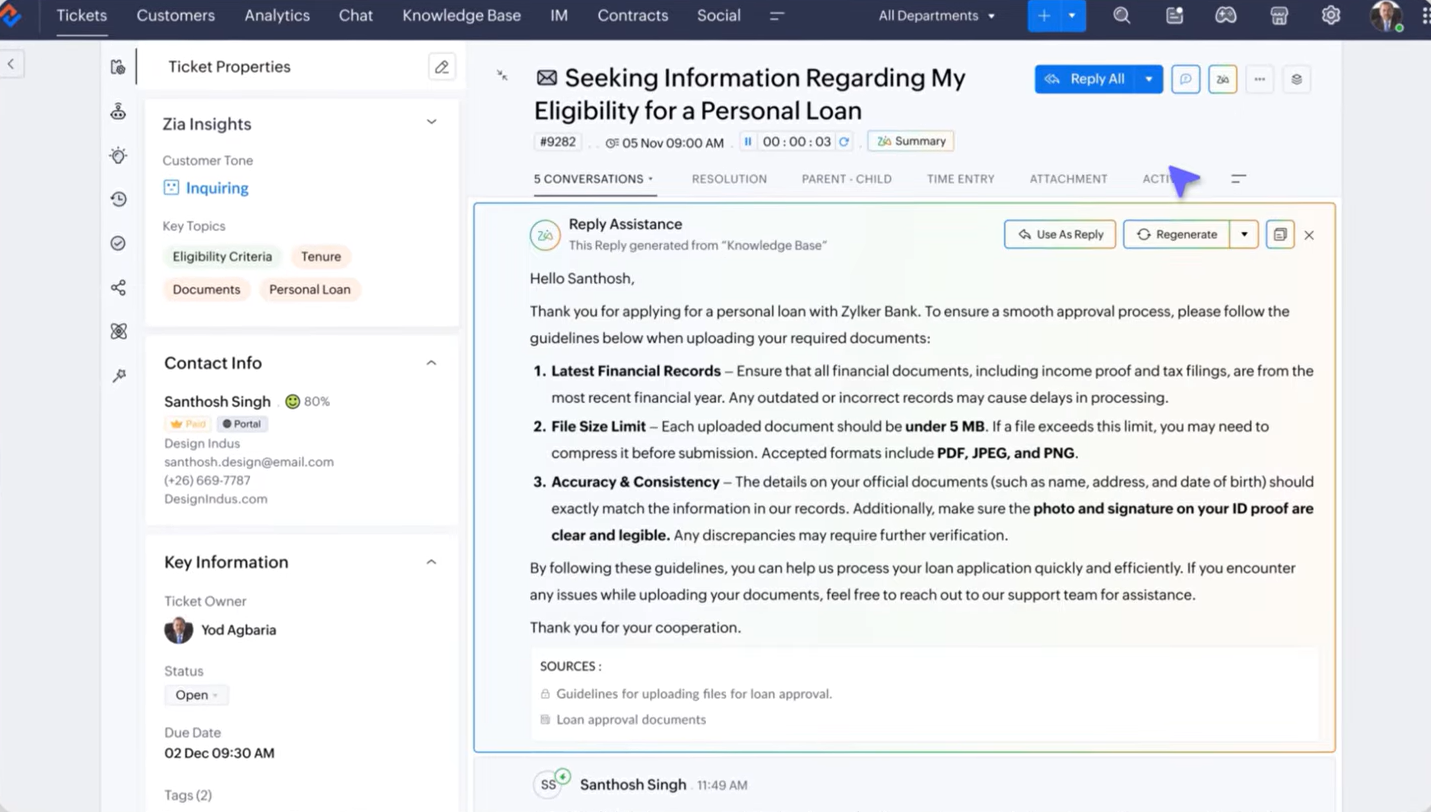
Best for: Zoho-centric SMBs wanting to enhance customer support efficiency.
Zia is the AI assistant built into Zoho Desk, designed to streamline customer-facing support. It uses NLP and generative AI to automate ticket handling, draft responses, and surface knowledge base insights. Recent updates add support for GPT-style models and advanced reply generation.
Feature Highlights:
- AI-Powered Ticket Automation: Automatically categorizes, assigns, and prioritizes tickets based on patterns learned from your historical data (needs ~500 tickets per field for training).
- Answer Bot & Suggestions: Deflects tickets by answering customer queries instantly from your knowledge base across web, chat, and email.
- Agent Assistance: Provides sentiment analysis, ticket summaries, tagging, and contextual writing help to improve agent response speed and quality.
- Generative AI Features: Drafts reply suggestions, summarizes tickets, and recommends knowledge base articles, with optional ChatGPT-style API integration.
- Automation & Flows: Guided Conversations (chatbot flows), no-code workflow triggers, and Blueprint for routing and self-service.
- Security & Compliance: GDPR-compliant and secure, with AI learning limited to your knowledge base, even when integrating with external LLMs.
Limitation: Primarily built for external customer service; not ideal for internal IT or HR workflows.
Pricing:
Available in the Enterprise plan, which is $40 per user per month (annual billing)
8. Kore AI
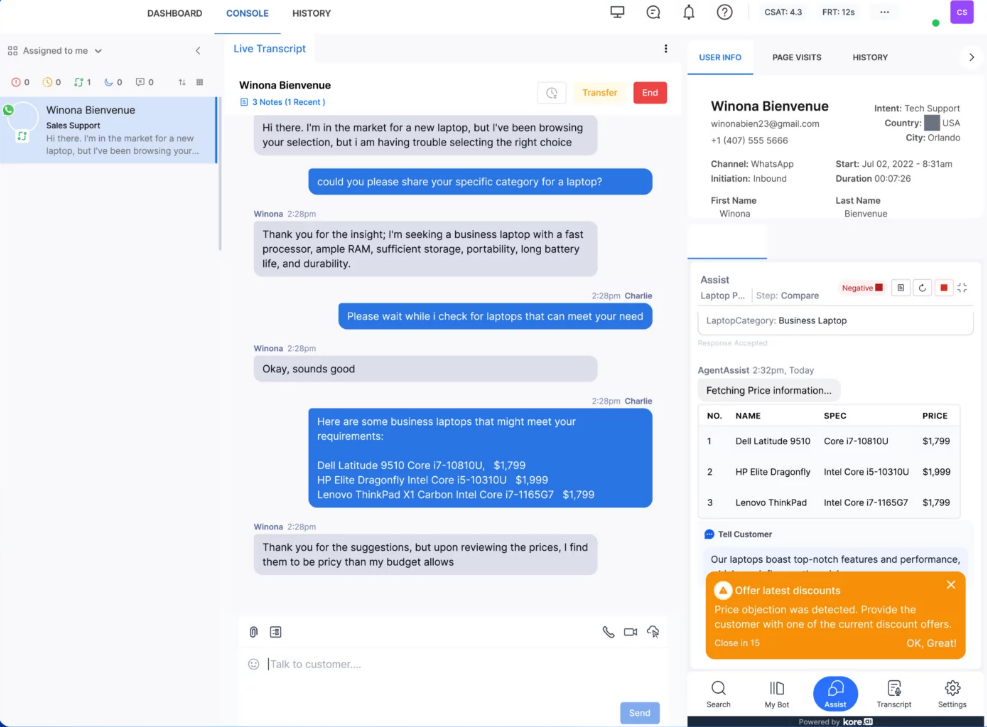
Best for: Large, global teams that need configurable, multilingual, and omnichannel virtual agents.
Kore.AI is a conversational AI platform built for large-scale automation across internal support (IT, HR, finance) and external customer service. With strong orchestration, multilingual NLP, and deep integrations, it’s widely used in industries like banking, healthcare, and insurance.
Support teams can deploy customizable virtual agents that manage IT, HR, and CX tasks across chat, voice, and email.
Feature Highlights:
- Configurable Virtual Agents: Build and deploy support bots with no-code/low-code tools, leveraging 400+ pre-built templates.
- Strong NLP & Sentiment Analysis: Understands complex, multi-turn employee or customer requests with domain-trained AI.
- Flexible AI models: Use Kore’s models or plug in third-party LLMs to tailor your support experience.
- Omnichannel Reach: Supports Slack, Teams, email, SMS, IVR, web chat, and more, in over 100 languages.
- Workflow Automation: Orchestrates backend processes and approvals, connecting seamlessly to ITSM, HRIS, and CRM systems.
- Enterprise Compliance: Meets SOC 2, GDPR, HIPAA, and other regulatory standards.
Limitation: Setup and maintenance can be complex, especially for voice and IVR. May feel too heavy for smaller, chat-centric teams.
Pricing:
Custom, based on scope and scale.
9. Aisera
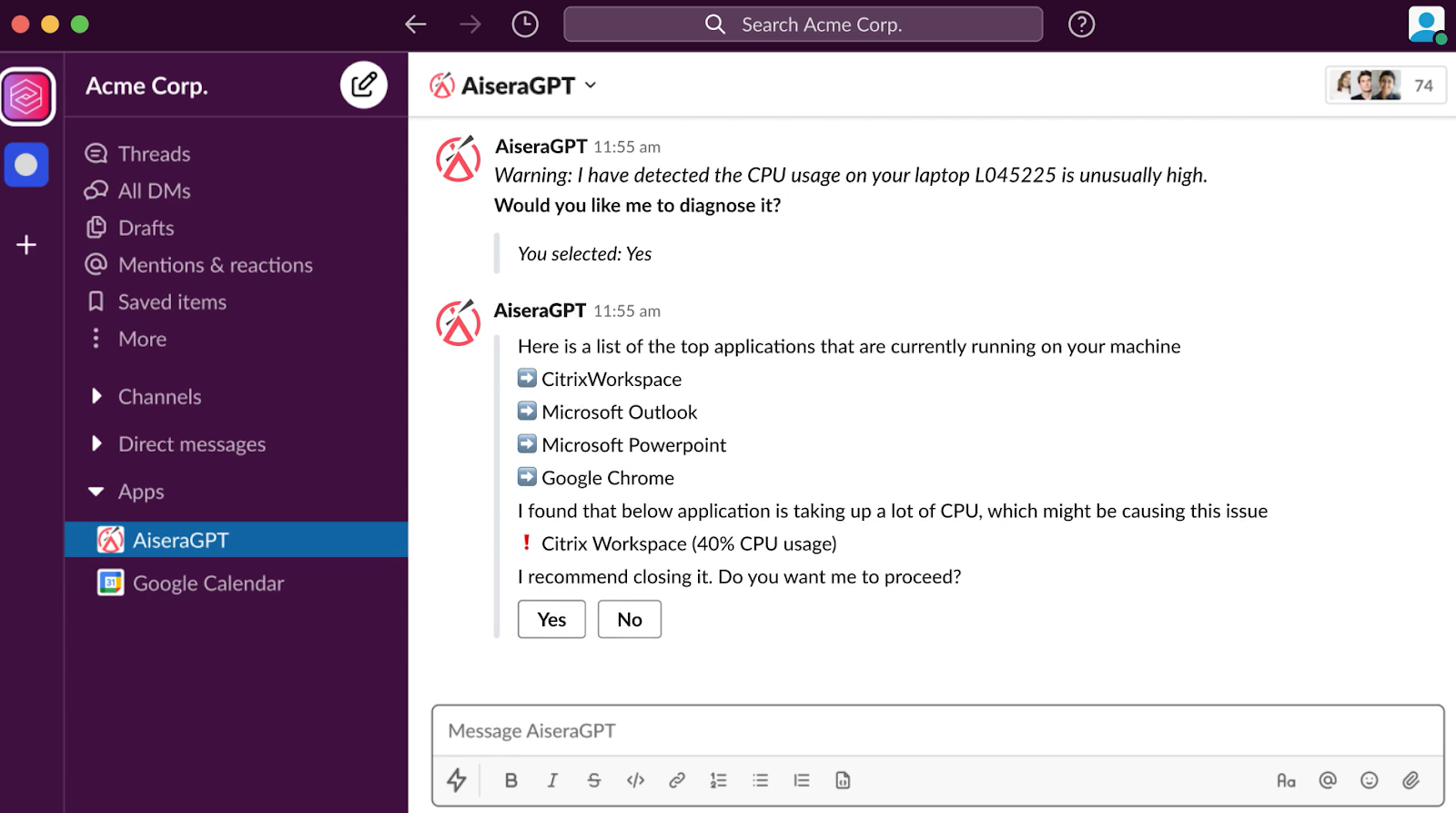
Best for: Large enterprises needing omnichannel AI across IT, HR, finance, and CX.
Aisera is an AI-powered service desk and virtual agent platform that automates IT, HR, and customer service workflows. It combines conversational AI (AiseraGPT) with RPA-style task automation and is deployed across multiple channels like chat, email, voice, and web.
Feature Highlights:
- High Automation & Deflection: Uses conversational AI and RPA to resolve queries automatically, reducing workload and speeding up support operations.
- Massive Integration Library: 500+ out-of-the-box integrations and thousands of prebuilt workflows for ITSM, HRIS, CRM, ERP, and more.
- Bring-your-own LLM: Option to use AiseraGPT or integrate your custom-trained LLMs.
- Omnichannel Virtual Agent: Supports Slack, Microsoft Teams, email, web, and even voice (IVR).
- Low-code Workflow Builder: Drag-and-drop design makes customizing workflows easier.
- Agent Assist & Orchestration: Multi-step task orchestration and intelligent agent hand-off across platforms like ServiceNow, Jira, Salesforce.
- Domain-specific LLMs: Models pre-trained on ITIL, HR, CRM, and ERP workflows for higher accuracy.
Limitation: Implementation can be complex and expensive for smaller organizations or those with less sophisticated needs.
Pricing:
Custom-quoted based on scope, channels, and user count.
10. Espressive
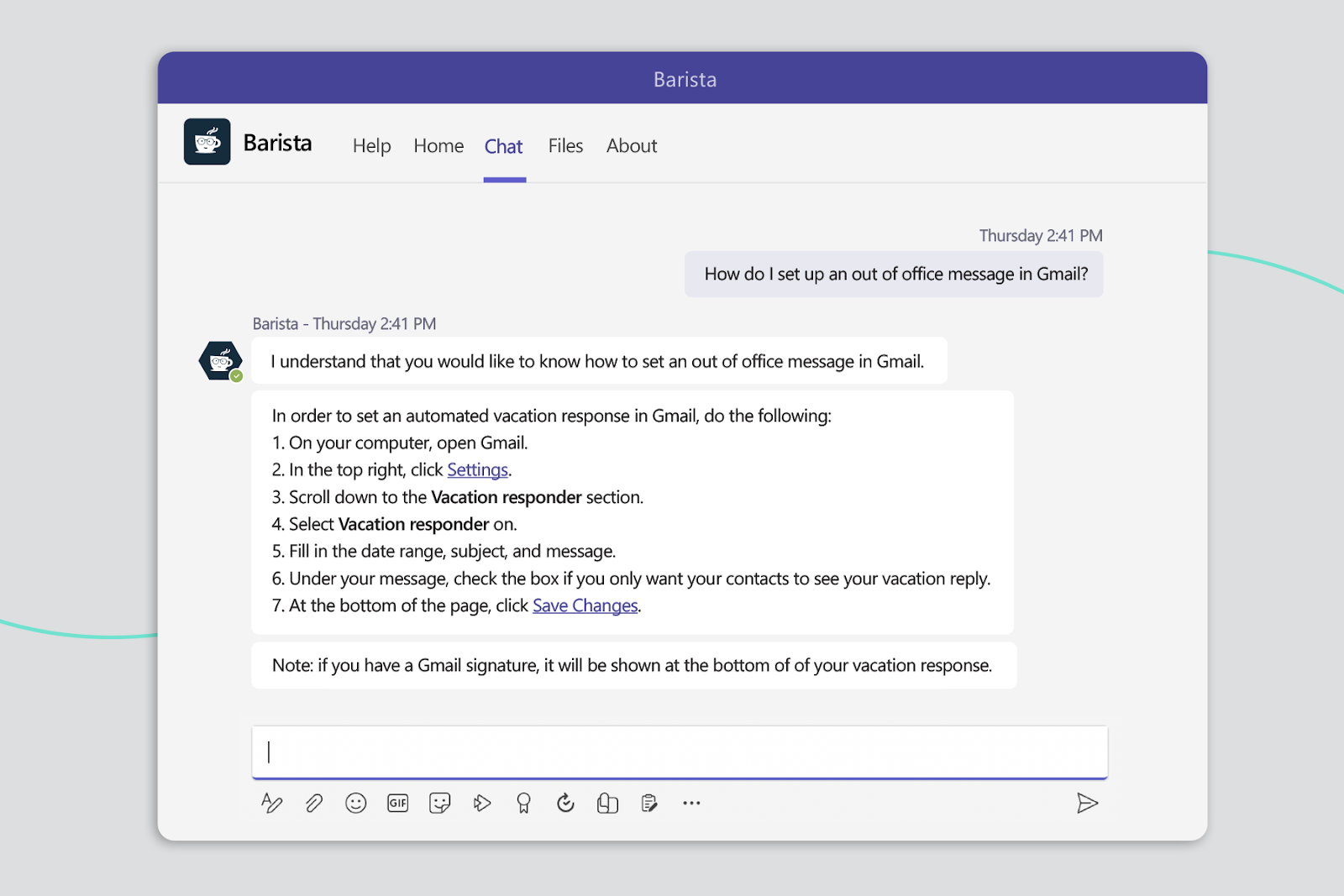
Best for: Enterprises needing intelligent, omnichannel support assistants for IT, HR, facilities, and finance teams.
Espressive offers BaristaGPT, a conversational AI virtual agent designed to understand how employees actually ask for help, even when their requests are vague or incomplete. Its Employee Language Cloud, trained on over a billion real-world queries, enables it to resolve IT, HR, facilities, and finance issues without rigid workflows.
Feature Highlights:
- Conversational, Multi-Turn Dialogues: Handles ambiguous requests, asks clarifying questions, and guides employees to resolution.
- Smart Ticket Routing: Automatically categorizes, prioritizes, and routes tickets accurately, reducing delays.
- Omnichannel Support: Accessible via Slack, Teams, mobile and desktop apps, web widgets, email, and voice.
- Workflow Automation & Proactive Support: Automates tasks like password resets, outage alerts, PTO requests, and employee surveys.
- Employee Language Cloud: Pre-trained on 1.3 billion phrases across 15+ domains, supporting 100+ languages.
- Sentiment Analysis: Detects employee mood in real time and adjusts tone accordingly.
- Live Generative Answers: Connects securely to LLMs like ChatGPT via Barista LLM Gateway for authoritative responses.
Limitations: Initial setup can take time, especially for complex enterprise workflows.
Pricing:
Custom, based on scale and requirements.
11. Glean
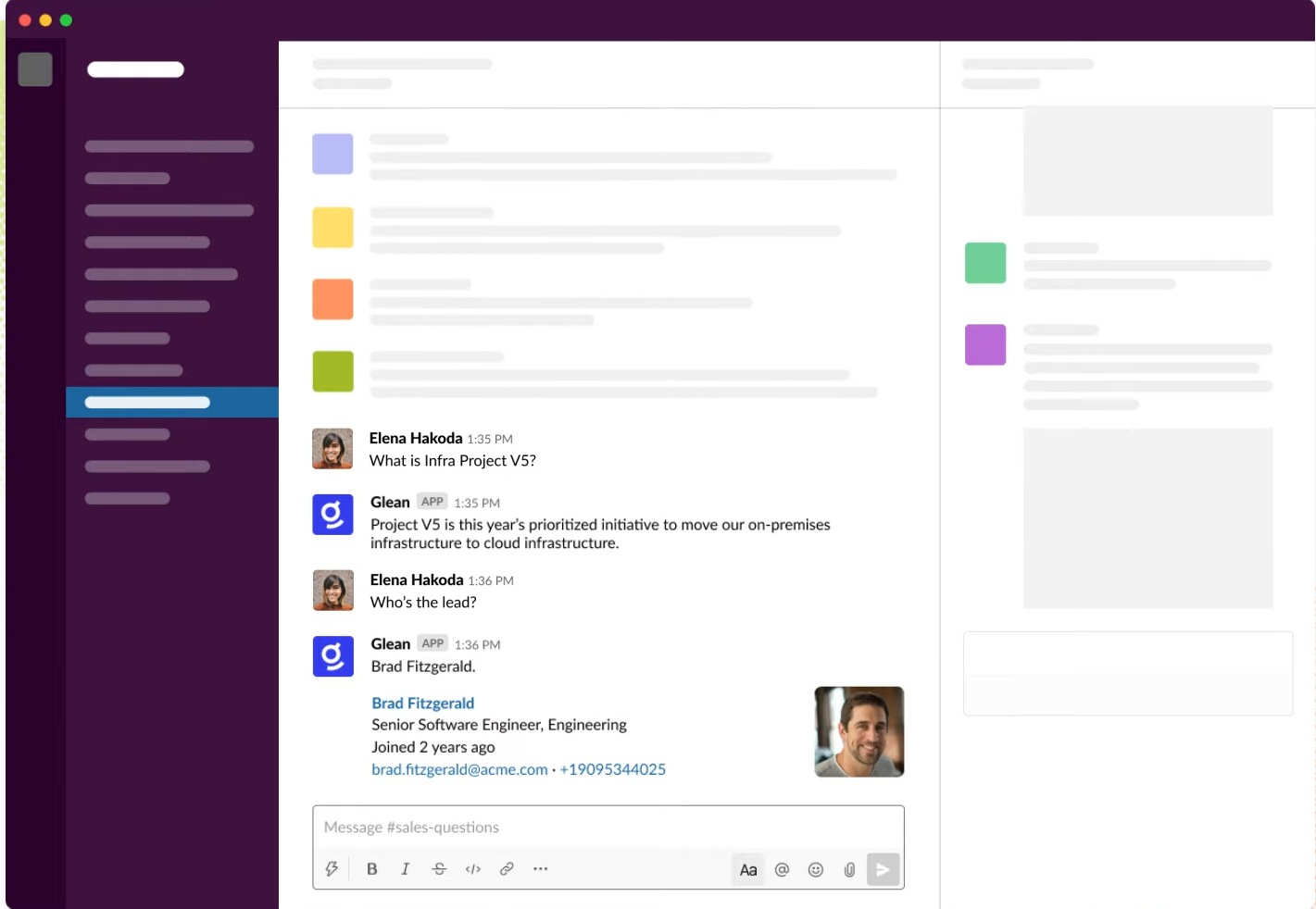
Best for: Teams that need to consolidate scattered knowledge into a single, AI-powered search experience.
Glean isn't a chatbot or workflow automation platform but an enterprise search engine that helps employees find what they need quickly, even when information lives in dozens of apps. It indexes knowledge across your entire stack and delivers context-aware, actionable search results.
Feature Highlights:
- Unified Search Across Systems: Indexes content from 70+ business apps into one searchable view.
- Actionable Results: Provides direct links and actionable shortcuts so employees can immediately act on what they find.
- Multi‑LLM Support: Uses multiple large language models to generate context-aware, accurate answers.
- Natural Language Queries & Filters: Supports conversational queries with advanced filters to narrow results.
- Personalized Insights: Suggests relevant content and documents based on user behavior and organizational context.
- Collaboration-Friendly: Makes shared insights and documents easily accessible to boost teamwork.
Limitation: Focused purely on knowledge search and discovery; doesn’t automate workflows or resolve tickets.
Pricing:
Custom pricing based on your organization's size and requirements.
12. Microsoft Capilot for Service
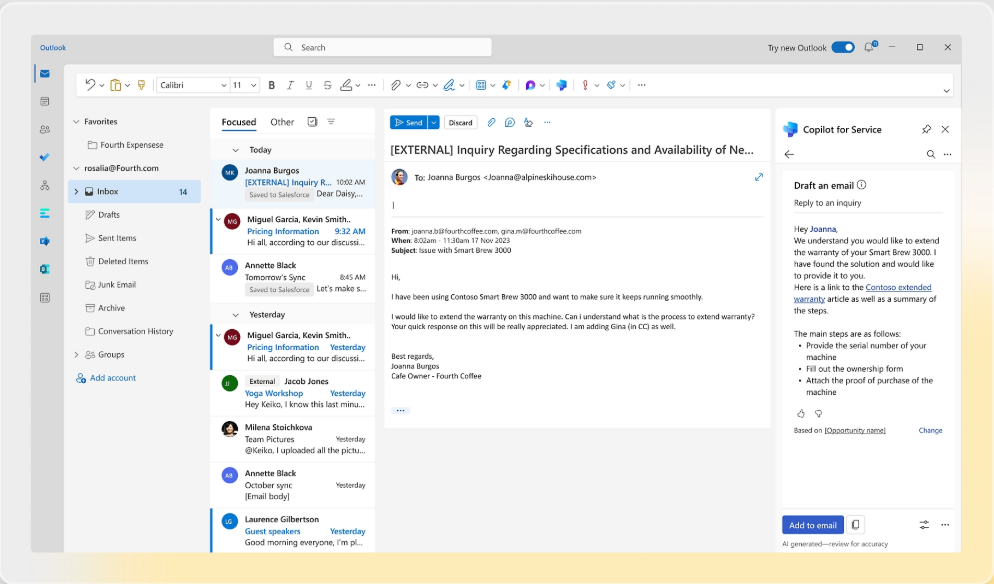
Best for: Customer service and support teams already on Microsoft 365 and Dynamics 365, particularly in contact center environments.
Microsoft Copilot for Service embeds generative AI into Teams, Outlook, and Dynamics 365. It helps agents work faster by drafting responses, summarizing chats, and pulling up relevant info, without leaving the Microsoft ecosystem.
Feature Highlights:
- Agent Assist in Teams & Outlook: Helps support agents handle customer queries faster by suggesting replies, surfacing knowledge, and summarizing conversation history.
- Knowledge Search: Instantly pulls up the most relevant knowledge base articles, CRM records, or documents during customer interactions.
- Response Suggestions: Draft context-aware replies to emails and chats based on case details for more consistent communication.
- Case Summarization: Condenses lengthy email threads, chat transcripts, and case notes into concise summaries so agents can catch up quickly.
- Actionable Workflows: Let agents initiate common service actions like creating, escalating, or closing tickets, directly from Dynamics 365 or Teams using Copilot templates.
Limitation: Focused primarily on customer service and contact center use cases rather than internal IT/HR helpdesk scenarios.
Pricing:
- Standalone Copilot for Service: $50 per user per month (billed annually).
- Add-On for Microsoft 365 Copilot users: Additional $20 per user per month.
- Requires Microsoft 365 licenses, with optional Dynamics 365 Customer Service and Copilot Studio for advanced features.
Wrapping Up
Moveworks is surely a great option and has set the standard for AI-powered support. But not every team needs its scale, cost, or complexity, especially after its acquisition by ServiceNow. Many are now choosing alternatives that better fit their size, tools, and way of working. Fortunately, today's market offers plenty of flexible, specialized options out there, as we’ve covered above.
Your choice should come down to what fits your workflows, tech stack, budget, and level of complexity. If you're looking for affordable automation built for Slack and Teams, without overhauling your existing systems, ClearFeed is a strong choice. It’s simple, fast, and built to plug into your existing setup.
Want to see it in action? Book a demo today and discover how ClearFeed's AI can make support smoother.
FAQs
1. Who does Moveworks compete with?
Moveworks competes with AI support automation platforms like ClearFeed, Aisera, and Freshservice. These tools help automate support tasks using AI and work well with platforms like Slack and Teams.
2. Which is best Moveworks alternative?
If you want smart ticketing inside Slack or Teams, ClearFeed is a great option. For more complex workflows, tools like Aisera and Forethought are better suited.
3. What should I look for in a Moveworks alternative?
Pick a tool that understands natural language, works with Slack, Teams, Jira, or ServiceNow, and can automate common tasks like tickets, HR requests, and access control
4. Which Movework alternatives support both Slack and Microsoft Teams?
Several tools support both, but ClearFeed stands out with native functionality across Slack and Teams, so your support workflows run smoothly regardless of the platform.



